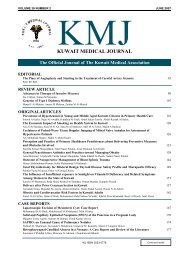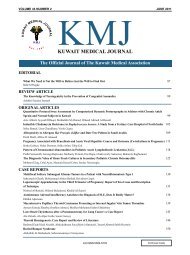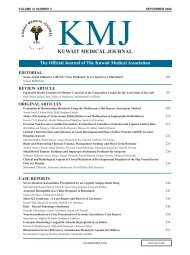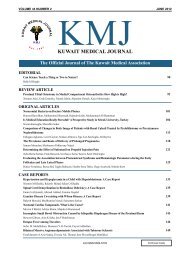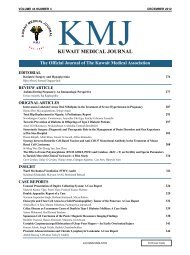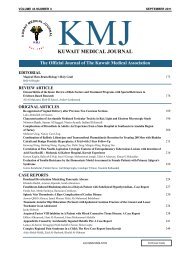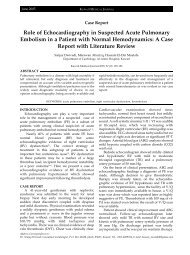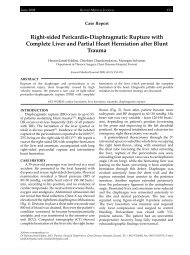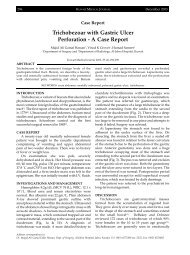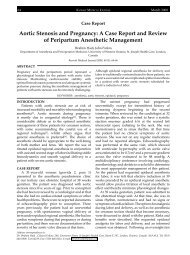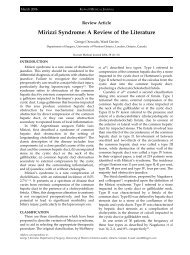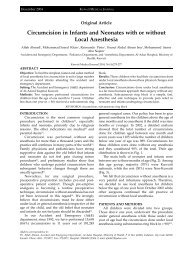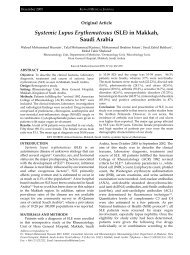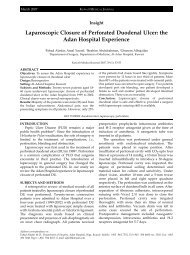<strong>June</strong> 20<strong>09</strong>KUWAIT MEDICAL JOURNAL 97cytokines that are harmful to the trophoblast. Hilland Choi speculate that cells in the decidua respondto trophoblast invasion by generating a Th1-dominated response which could be detrimentalto early placental growth and may be toxic to thedevelopment of the embryo [50] . Alternatively Th1cytokines may convert NK cells to lymphokineactivatedkiller (LAK) cells that have been shownto lyse trophoblast cells; levels of LAK cells in theblood correlate with high miscarriage rates [51] .Decidual NK cells are not cytolytic, but produce IFNγwhich activates decidual macrophages which thensecrete toxic levels of nitric oxide [51] . For their part,activated macrophages may bring about damage tothe conceptus not by direct lysis of trophoblast cells,but via the production of nitric oxide and TNFα [52] .The role of Th1 cytokines in this scenario would beto activate such cellular effectors and to also causeapoptotic damage to the placenta.Th1 cytokines, such as TNFα and IFNγ, maydirectly damage the conceptus by apoptosis oftrophoblast cells [37] and by inhibiting the secretionof the growth-stimulating GM-CSF from the uterineepithelium [36] . Clark et al propose that maternal“rejection” of the implanted conceptus may bedue to the process of what they term “cytokinetriggeredvascular autoamputation” which involvesthe activation of coagulation mechanisms, leadingto vasculitis affecting maternal blood supply to theimplanted embryo [53] .Cytokine Patterns in Preterm DeliveryPreterm delivery (PTD) is an important cause ofperinatal morbidity and mortality and a conditionfor which there is a dearth of treatment modalities [54] .It occurs at a rate of 12.5%. Preterm labor is believedto be initiated by inappropriately early activationof elements that initiate normal parturition atterm. Factors that predispose to preterm labor andpreterm delivery include premature rupture of fetalmembranes, pregnancy-induced hypertension,amniotic fluid infection, faulty placentation, seriousmaternal disease and genetic factors. Several factorssuch as changes in the levels of progesterone,oxytocin, relaxin, prostaglandins, cortisol, andcorticosteroids have been studied in relation to theonset of PTD; however, the etiology of many casesof PTD is unexplained [55] .There is strong evidence available to suggestthat pro-inflammatory cytokines are involved inthe sequence of events leading to preterm labourand delivery associated with intrauterine infection.Increased levels of the pro-inflammatory cytokinesIL-1, TNFα, IL-6 and IL-8 have been found inthe amniotic fluid of women with infectionassociatedpreterm labor [56] . Higher levels of IFNγin cervicovaginal fluid, IL-1, TNFα and IL-6 inplacental cells and IL-1β, IL-6 and IL-8 in amnioticand chorionic-decidual tissues and in cervicalsecretions [57] are found in PTD as compared to normalterm delivery. Indeed Romero et al propose thatpreterm labor in the setting of infection results fromthe actions of pro-inflammatory cytokines secretedas part of the fetal and/or maternal host responseto microbial invasions and suggest that a fetal proinflammatorycytokine response is followed by theonset of spontaneous preterm parturition [58] . Dudleysuggests that pre-term labor associated with subclinicalinfection may trigger a dysregulation of alocal inflammatory response leading to a so called“intra-uterine inflammatory response syndrome”leading to pre-term labor and delivery [59] . Even inthe absence of intrauterine infection, pre-term laborhas been shown to be associated with enhancedplacental cytokine production; elevated levels ofIL-1, IL-6 and IL-8 have been demonstrated inpremature parturition with no signs of infection [60] .We have demonstrated that higher levels ofthe Th1 cytokines IL-2 and IFNγ are producedby women with unexplained PTD, while greaterconcentrations of the Th2 cytokines IL-4, IL-5and IL-10 are produced by mitogen-stimulatedperipheral blood lymphocytes from women withnormal pregnancy [61] . Furthermore, the ratios ofTh1 to Th2 cytokines in PTD versus normal termdelivery are indicative of a bias toward strongerpro-inflammatory cytokine reactivity in PTD. Theseobservations support the existence of a so-calledintrauterine cytokine-based inflammatory responsesyndrome which may account for preterm laborwith both infectious and non-infectious etiologies,suggesting that the production of inflammatorycytokines may form the pathophysiologic basis forthis association.Thus, we can view the positive and negativeinfluences of the immune system on pregnancy asa sort of balancing act that needs to be performed toensure the success of pregnancy (Fig. 1).Based on these observations, therapies thatdown-regulate Th1 cytokine reactivity may well bevaluable in the clinical management of recurrentmiscarriage and premature labour and delivery witha predominant Th1 cytokine bias. Various strategiesare worth pursuing; these include the downregulationof Th1 cytokines, the neutralization of Th1cytokines and the upregulation of Th2 cytokines.MODULATION OF CYTOKINE RESPONSESTOWARDS A PREGNANCY-FRIENDLY PATTERNThe demonstration of an association betweenconditions such as RSM and PTD and maternal Th1cytokine bias on the other, has led to research on
98The Immune System in Pregnancy: Friend or Foe?<strong>June</strong> 20<strong>09</strong>Fig. 1: The possible influences of maternal Th1 and Th2 immunereactivity on pregnancy. Th1-type cytokines acting directly andvia effector cells such as activated macrophages, activated natural(NK) cells and lymphokine-activated killer (LAK) cells may lead topregnancy complications and pregnancy loss. On the other hand,Th2 cytokines, progesterone, progesterone-induced blockingfactor (PIBF), cytokines such as IL-3, GM-CSF and CSF-1 that haveplacental growth-promoting properties help prevent Th1-mediateddeleterious effects on the conceptus.manipulating the cytokine balance so as to downregulatepro-inflammatory cytokines such as IFNγand TNFα; this is expected to create an environmentthat is more conducive to the success of pregnancy.One approach would be to use a hormone suchas progesterone, which has been shown to haveanti-inflammatory and immunosuppressiveproperties [62] . Piccinni and colleagues demonstratedthat progesterone induces the development ofhuman T cells producing Th2 cytokines [20] . Theypropose that as the Th1 cytokines IFNγ and TNFαmay compromise pregnancy, the production of Th1-inibitory Th2-type cytokines may allow allografttolerance and fetus survival and that progesteronemediatedimmunosuppression is needed for the“natural” maintenance of normal gestation.These observations inspired us to investigatedydrogesterone (6-dehydro-9β, 10α-progesterone)for potential immunomodulatory properties.Dydrogesterone is a potent orally-administeredprogestogen, similar to endogenous progesterone inits molecular structure and pharmacological effects,with a high affinity for the progesterone receptor.We exposed lymphocytes from women with RSM orwith PTD to the progestogens, dydrogesterone andprogesterone, and observed that dydrogesteronebrings about a significantly reduced secretionof the Th1 cytokines IFN-γ and TNF-α, as doesprogesterone. On the contrary, levels of IL-4 and IL-6,both Th2 cytokines, are significantly elevated in thepresence of dydrogesterone or progesterone. Thus,the levels of Th1 cytokines decreased significantlywhile levels of Th2 cytokines increased significantlywhen cells were exposed to dydrogesterone orprogesterone [23] . We found a marked reductionin the ratios of Th1 to Th2 cytokines indicating adecrease in Th1 cytokine bias in lymphocytes fromboth women with RSM [23] and with PTD [24] .In order to ascertain whether dydrogesterone andprogesterone mediate their cytokine-modulatingeffects via the progesterone receptor, we tested theinfluence of the progesterone-receptor antagonist,RU486 on cytokine modulation by dydrogesteroneand progesterone. Since RU486 competes withprogesterone (and dydrogesterone) for theprogesterone-receptor, if the addition of RU486reverses the effects of these substances, it wouldindicate that dydrogesterone and progesterone haveto interact with the progesterone-receptor in orderto affect cytokine production. When PBMC fromsubjects with unexplained RSM were cultured withdydrogesterone or progesterone in the presence orabsence of RU486, we observed increased levels ofIFN-γ and TNF-α which are otherwise suppressedby dydrogesterone and progesterone, and decreasedlevels of IL-4 and IL-6 which are otherwiseupregulated by dydrogesterone and progesterone.Thus RU486 reverses the effects of dydrogesteroneindicating that the effect of dydrogesterone andprogesterone is mediated via the progesteronereceptor [23] .Our data based on laboratory studies indicatethat significantly lower levels of the Th1-typecytokines IFN-γ and TNF-α are produced bylymphocytes exposed to dydrogesterone. Thesetwo cytokines have been shown to deter embryodevelopment, implantation events and proliferationof the trophoblast [54] and to have apoptotic effectson human trophoblast cells [36] . In animals, thesecytokines bring about fetal demise when injectedduring gestation [34] . Furthermore, IFN-γ and TNF-αmay mediate placental / fetal damage via activationof NK activity and macrophages [52] , both of whichin their activated states have been shown to havedeleterious effects on the embryo. Thus, studiesdemonstrating an association between high levelsof these Th1 cytokines and unexplained RSMindicate a potential benefit in down-regulating theirproduction.We found that IL-4 and IL-6, both Th2 cytokines, areupregulated in the presence of dydrogesterone [23,24] .Increased production of IL-4 has been shown to favorfurther Th2 bias which would affect the eventualoutcome of Th1/Th2 dichotomy [3,4] . It is relevant tonote that progesterone has been shown to promotethe differentiation of T cells into Th2 effectors and is



